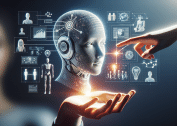Artificial Intelligence (AI) is no longer a futuristic concept; it’s an integral part of our daily lives in 2025. From smart assistants managing our schedules to AI-driven healthcare solutions, the influence of AI is pervasive and transformative. This article explores the current hot topics and emerging trends in AI that are shaping our everyday experiences.Artificial Intelligence (AI) is no longer a futuristic concept; it’s become part of our daily routines. From managing schedules to offering real-time health advice, AI’s reach is broader and more transformative than ever. This article explores the current hot topics and emerging trends in artificial intelligence in daily life.

AI-Powered Personal Assistants: More Than Just Reminders
Today’s AI assistants have evolved far beyond basic tasks. In fact, platforms like OpenAI’s Operator can autonomously handle web-based tasks such as filling out forms, placing orders, or booking appointments—freeing up valuable time (OpenAI Operator 2025). Additionally, Samsung’s Galaxy AI suite delivers impressive tools, including live voice translation, personalized writing suggestions, and proactive health monitoring (Samsung Galaxy AI 2025).
These advancements don’t just save time—they improve productivity and make daily interactions smoother. Moreover, they mark a clear shift from reactive assistants to proactive digital companions.
Personalized and Predictive AI in Healthcare
Artificial Intelligence is revolutionizing healthcare by offering personalized treatments and predictive diagnostics. For instance, AI algorithms can process immense datasets to detect illnesses at an early stage, guiding clinicians toward more accurate decisions (Syracuse University iSchool 2025). Furthermore, virtual assistants powered by AI offer round-the-clock support, helping patients manage medications and track vital signs.
Consequently, healthcare becomes more efficient, accessible, and tailored to individual needs. This transformation isn’t just technological—it’s deeply human.
AI in Classrooms: Early Exposure for Long-Term Impact
Recognizing the future demand for AI skills, many educational systems are incorporating AI tools from early childhood. In the United Arab Emirates, for example, children as young as four are introduced to AI concepts to build critical thinking and problem-solving abilities (Financial Times 2025).
AI also enhances classroom learning by adapting educational content to each student’s pace and style. As a result, student engagement improves, and learning outcomes become more consistent across diverse groups.
Smarter Shopping with AI-Powered E-Commerce
Shopping has never been smarter, thanks to AI. Platforms now use artificial intelligence to offer personalized product recommendations, price comparisons, and visual previews, all within a single interface (Vogue Business 2025). These capabilities significantly enhance the online shopping experience, making it more intuitive and efficient.
Not only does this boost customer satisfaction, but it also increases sales for retailers. In a world saturated with choices, AI helps consumers find exactly what they need—faster and more accurately.
The Workplace Revolution: AI for Daily Productivity
Artificial intelligence is also changing how we work. Employees now rely on AI tools to draft emails, summarize meetings, and automate routine reports. According to a 2025 analysis, this shift allows more time for strategic thinking and problem-solving (Financial Times 2025).
Furthermore, AI tools enhance collaboration by offering real-time language translation and transcription services. These developments foster a more inclusive and globally connected workplace environment.
Navigating Ethical Challenges in an AI-Driven World
Despite its benefits, AI brings with it a series of ethical concerns. Issues such as data privacy, algorithmic bias, and job displacement are significant and must be addressed with urgency. Therefore, governments and organizations are urged to adopt transparency and accountability frameworks to maintain public trust.
Ethical AI isn’t just a trend—it’s a necessity. Proactively tackling these challenges ensures that technological progress aligns with societal well-being.
Conclusion
The role of artificial intelligence in daily life is expanding rapidly across sectors like healthcare, education, commerce, and the workplace. These advancements not only enhance convenience and efficiency but also promise a more personalized experience for users. However, addressing the ethical dimensions remains crucial to ensuring sustainable growth.
As AI becomes more embedded in our routines, its influence will only grow. Embracing this technology thoughtfully can lead to a future that is both smart and equitable.
References:
- OpenAI Operator. (2025). Wikipedia. Retrieved from https://en.wikipedia.org/wiki/OpenAI_OperatorWikipedia
- Samsung Galaxy AI Features. (2025). Wikipedia. Retrieved from https://en.wikipedia.org/wiki/Galaxy_AIWikipedia
- Key Benefits of AI in 2025. (2025). Syracuse University iSchool. Retrieved from https://ischool.syracuse.edu/benefits-of-ai/iSchool | Syracuse University
- UAE to Introduce AI Classes for Children as Young as Four. (2025). Financial Times. Retrieved from https://www.ft.com/content/d6f54a83-cdee-46d0-9555-95ff45fbfaabFinancial Times
- Could ChatGPT Fix Online Shopping? (2025). Vogue Business. Retrieved from https://www.voguebusiness.com/story/technology/could-chatgpt-fix-online-shoppingVogue Business
- How AI Agents Compare on Routine Work Tasks. (2025). Financial Times. Retrieved from https://www.ft.com/content/9a1736aa-45be-4f54-b05b-468e04ed8b4aFinancial Times









